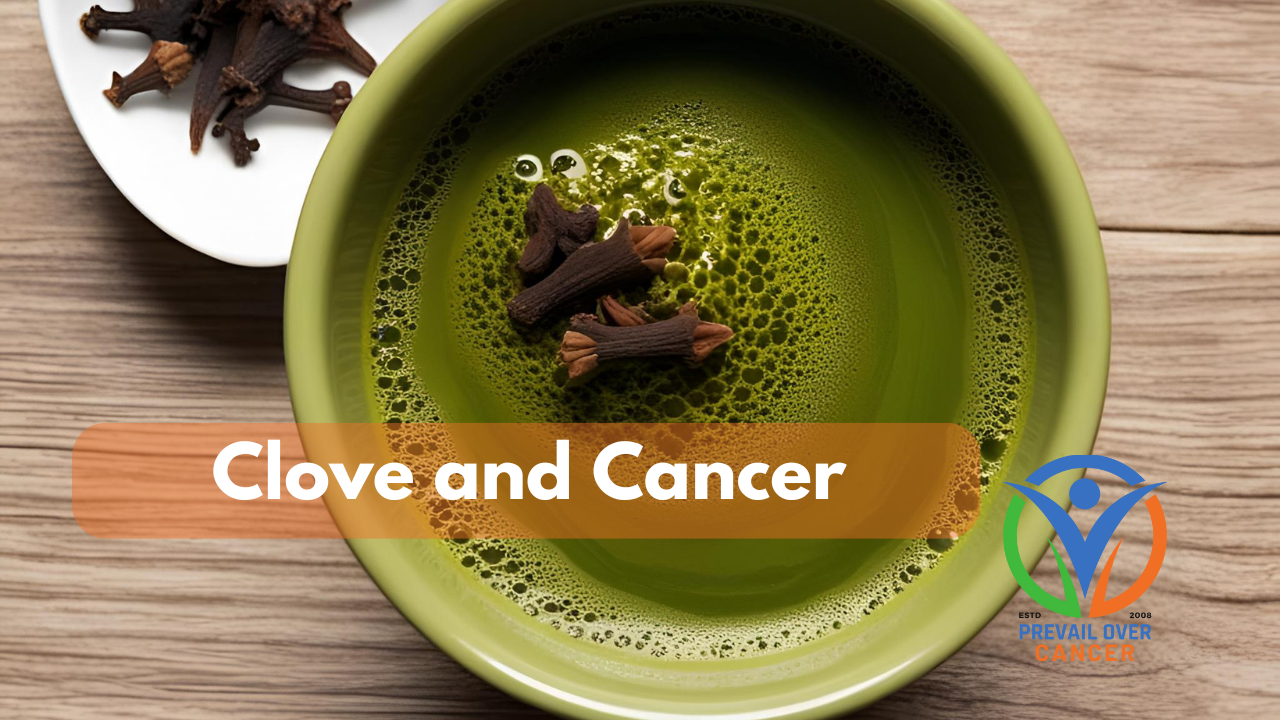Clove and Cancer

Researched and written by Keith Bishop, Clinical Nutritionist, Cancer Coach, and Retired Pharmacist.
Cloves are the dried flower buds of the evergreen tree Syzygium aromaticum. They are commonly used as a cooking spice and have been used in traditional medicine for centuries.
Clove, a spice native to Indonesia's Maluku Islands, has been esteemed for centuries in traditional medicine systems such as Ayurveda and Traditional Chinese Medicine (TCM). Historically, it has been utilized to address many ailments, including dental pain, digestive issues, respiratory conditions, and reproductive health concerns. The therapeutic properties of clove are attributed mainly to its rich phytochemical composition, notably eugenol, eugenol acetate, and β-caryophyllene, which confer antimicrobial, anti-inflammatory, analgesic, and antioxidant effects.[i]
In traditional practices, cloves were commonly employed to alleviate toothaches and oral infections, owing to their potent analgesic and antis...
Unlocking the Power of Fisetin: A Natural Ally in Cancer Prevention & Treatment
Discover the Potential of Fisetin in Enhancing Cancer Prevention and Treatments
Written by Keith Bishop, Clinical Nutritionist, Cancer Coach, and Retired Pharmacist
Imagine a simple, delicious addition to your diet that could significantly lower your risk of developing cancer. Sounds too good to be true? Enter fisetin, a natural flavonoid in your favorite fruits and vegetables. Recent research has highlighted its powerful anticancer properties, making it a promising candidate in the fight against one of the most prevalent cancers. Ready to discover how this humble compound can make a difference in your health journey? Let's dive into the fascinating world of fisetin and uncover its secrets.
Fisetin, a natural flavonoid in various fruits and vegetables, has garnered significant attention for its potential anticancer properties. This blog post delves into fisetin's anticancer benefits, its impact on cancer, food sources, and potential concerns, including drug interactions.
Anticancer...
The Power of Beans: A Weapon Against Cancer

Beans and Legumes are a much-needed weapon against cancer.
Beans and legumes, the humble staples of many global cuisines, are gaining recognition in the scientific community for their potential role in reducing the risk and mortality of many diseases and cancer. This blog post will delve into the research behind these claims, shedding light on why I put beans and legumes in my Cancer Food Pyramid Tactic.
What are Beans and Legumes?
Beans and legumes are the fruits or seeds of a family of plants called Fabaceae. They are rich sources of fiber, essential vitamins and minerals, and plant-based protein. Common examples include chickpeas, lentils, peas, kidney beans, black beans, soybeans, pinto beans, navy beans, and peanuts.[1]
Learn How to Select a Quality Dietary Supplement
Nutritional Powerhouses
Beans and legumes are high in minerals and fiber without the saturated fat found in some animal proteins. They are rich in plant protein, fiber, B-vitamins, iron, folate, calcium,...
Avocado Fruit – Cancer Caution for Some?
How many of you love avocadoes? What is the impact on cancer?
Researched and Written by Keith Bishop, Clinical Nutritionist, Cancer Coach, Retired Pharmacist, and Founder of Prevail Over Cancer.
My wife and I do! With our family cancer history of hormone cancers, we will still enjoy but limit our avocado or guacamole to less than once a week.
Previous laboratory cancer cell studies have shown purified nutrients and plant chemicals in avocadoes suggests this fruit has anticancer activities. But actual human intake and cancer risk have not been evaluated until recently.
In April 2023 a research study of data from 45,289 men in the Health Professionals Follow-Up Study (HPFS) and 67,039 women in the Nurses’ Health Study (NHS) evaluated avocado consumption and the risk of cancer.
In the HPFS, consuming more than 1 avocado a week was associated with a decreased risk of only colorectal cancer, lung cancer, and bladder cancer in men. Other cancer rates were not affected. In the NHS, avoc...




